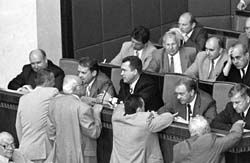Parliament Seeks Common Sense

On September 3 Verkhovna Rada began the second session of its fourth convocation. There was the traditionally solemn opening ceremony, the difference being that this time the anthem of Ukraine was performed by the Veriovka Chorus, not the Ministry of Defense Band. First of all, the deputies chosen in the July 14 by-elections — Viktor Drachevsky (constituency No. 35), Mykola Odainyk (constituency No. 18) and Nestor Shufrych (constituency No. 201) — were sworn in. As the press gallery expected, some deputies could not resist the temptation of displaying the level of their culture as they were taking the oath. For example, when Mr. Drachevsky mounted the podium, a dozen Our Ukraine members (especially from the Party of Reforms and Order) loudly chanted “Shame!” Fortunately, Our Ukraine’s political adversaries chose not to follow this contagious example, and a quiet atmosphere greeted Yushchenko bloc Deputy Odainyk’s swearing in. The deputies honored the memory of those killed at Lviv’s Sknyliv airfield and of People’s Deputy Oleh Oleksiyenko who died this summer.
What topped the bill on the second session’s first day was presentation of the president’s letter to the parliament. Since the head of state was away at the World Development Summit in Johannesburg, South Africa, the letter’s text was read out by Oleksandr Zadorozhny, President’s permanent representative in Verkhovna Rada. The presidential letter focused on calling the deputies to begin working for the Constitutional amendments that would allow Ukraine to switch to the parliamentary-presidential form of government. The head of state said that the initiative to change the system of government in Ukraine was a “well-considered choice... My proposals (to change the system of government in this country — Ed.) are no joke or loyalty check,” the letter says. The president noted he was surprised by the opposition’s reaction to the proposal of political reform in Ukraine. He recalled that the opposition itself had earlier called for similar changes and now “found itself unprepared” for them. The president did not agree with those who say that the proposed changes “are premature because of the lack of political culture and a civil society... If we think like this, the time will never come,” he pointed out.
According to him, the political reform is not a onetime action “to appease the fractions by distributing governmental portfolios... It is a complex and progressive process aimed at creating an effective and responsible system of government.” Pres. Kuchma expressed confidence that those who will draft the Constitutional changes will take into account all the necessary checks and balances, “including the right of the president to dissolve Verkhovna Rada.” It was particularly stressed that making amendments to the Constitution is the prerogative of parliament. “I believe in your high professionalism and responsibility to those who elected you,” the letter says. Pres. Kuchma called on the deputies to form a parliamentary majority and make motions on the composition of a coalition government. “I am ready even today to introduce the majority’s proposals in Verkhovna Rada,” he stressed in his letter.
In addition to touching on the matters of government structure, the letter to the parliament also dealt with social and environmental problems. The president thinks that “principles of social justice” should be a top priority for all officials. “While addressing the problems of lawmaking, you must not ignore the solution of social and environmental problems. Pres. Kuchma is worried over the slow pace of reforms in Ukraine’s public-health and pension system. The head of state also urged the deputies to timely discuss and adopt the 2003 budget by passing a “well-thought-out and realistic” document.
The deputies and journalists were also addressed by Prime Minister Anatoly Kinakh and Verkhovna Rada Speaker Volodymyr Lytvyn. The head of government said he was sure the Cabinet of Ministers and Verkhovna Rada would join forces to carry out the constitutional reform. Moreover, according to the premier, the main goal is not to redistribute portfolios yet again but to set up an effective model of public administration. Premier Kinakh suggested on behalf of the government that the deputies first of all discuss the draft Tax Code as well as a number of other documents designed to ease pressure on individual incomes and improve the VAT-collection mechanism. Verkhovna Rada Speaker Lytvyn expressed the hope that the parliament would be a stabilizing pivot in the system of government in spite of our “ever-radicalizing political life.” Mr. Lytvyn cautioned his colleagues against “drawing Verkhovna Rada into the debates on early presidential and parliamentary elections under the guise, so to speak, of political reform.” The speaker also emphasized that the second session “will fundamentally determine the face, nature, and results of this country’s highest legislative body over the whole period of its mandate.”
Also last Tuesday, another real step was taken to form a parliamentary majority. Nine factions and groups (the Party of Ukraine’s Industrialists and Entrepreneurs, Labor Ukraine, the People’s Democratic Party, the Regions of Ukraine, the Agrarians of Uk raine, SDPU(O), and the groups People’s Power, European Choice , People’s Choice, and Democratic Initiatives) made public an official address to other parliamentary associations, calling on them to support the initiative of forming a parliamentary majority. The address notes that most political parties represented in the parliament have already backed in principle the transformations proposed by President Kuchma, particularly transition to the parliamentary- presidential form of government, proportional representation elections to Verkhovna Rada, the formation of a coalition government, and making systemic amendments to the Constitution. The nine parliamentary factions and groups are convinced that “transparent, open, and urgent actions should be taken to map out approaches to forming a parliamentary majority, passing the necessary laws, including those regulating activities of the opposition, and drawing up the concept of reforming the political system.” The document authors are calling, first of all, for establishing a standing parliamentary majority, forming a coalition government, and making systemic amendments to the Constitution of Ukraine.






